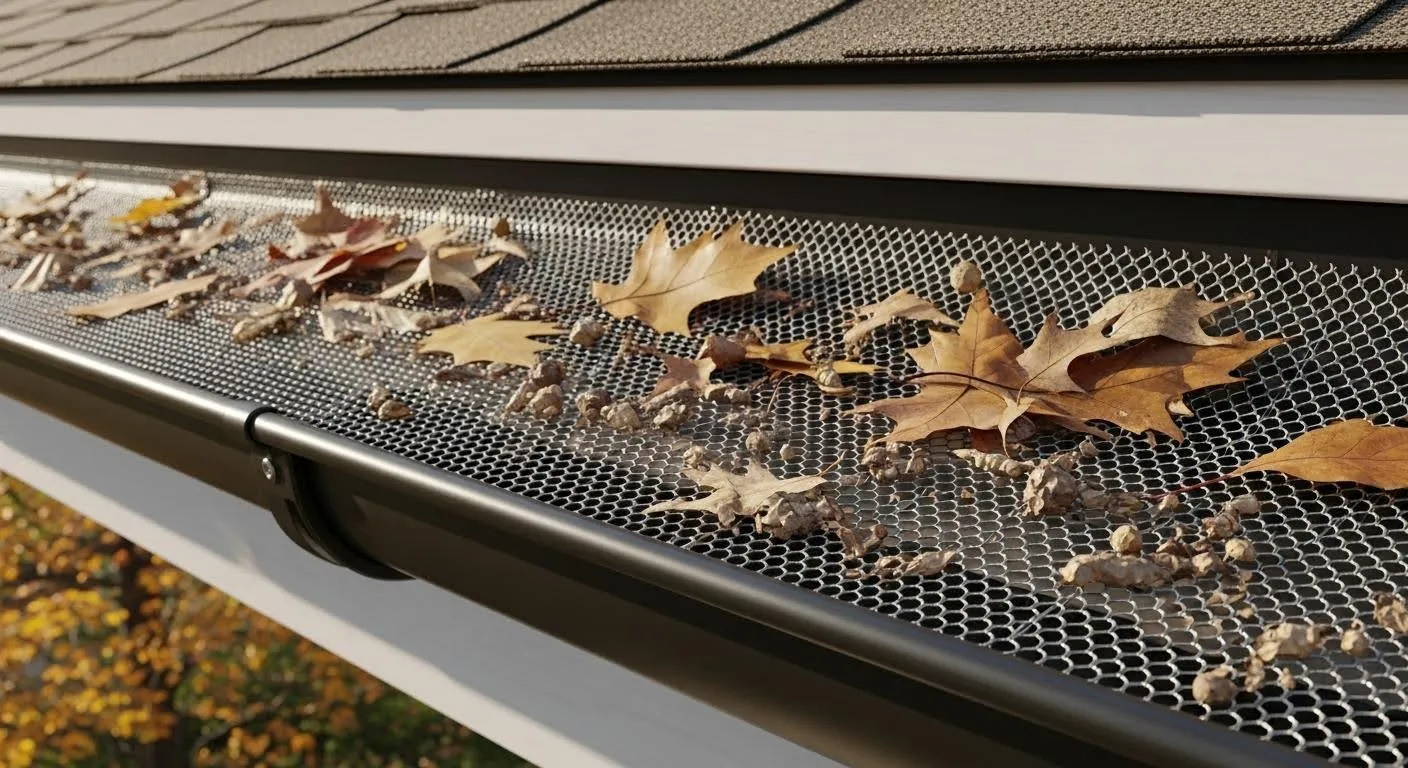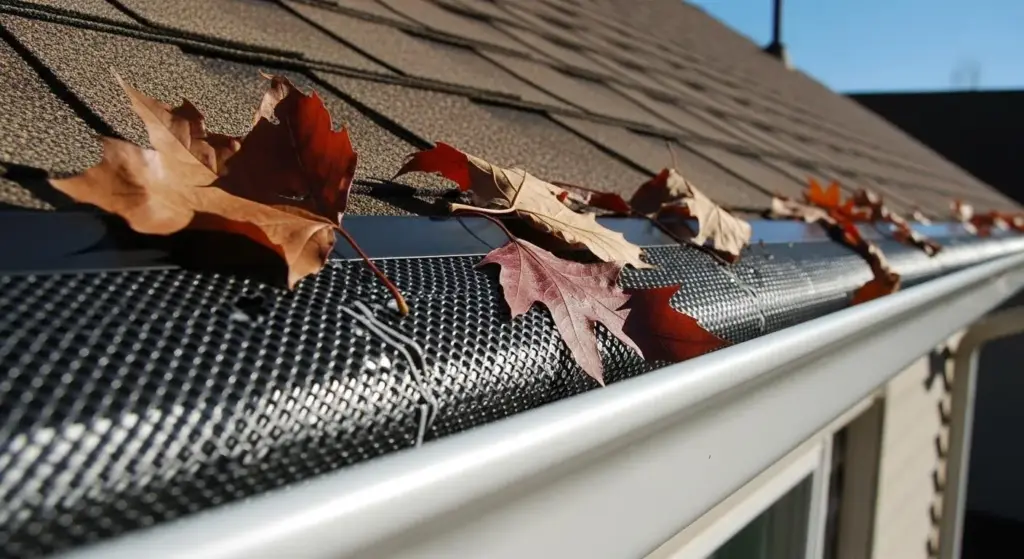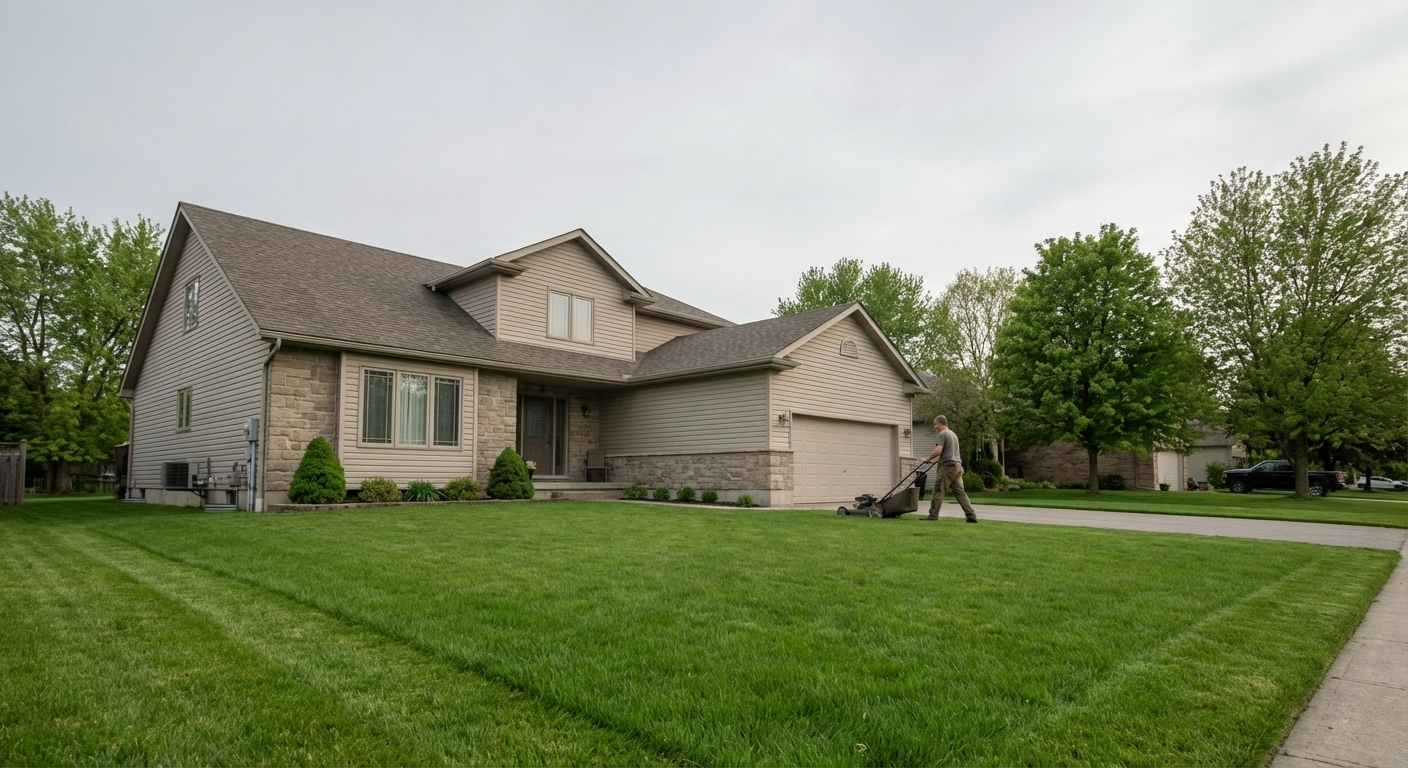If you’ve lived in Ontario through at least one full cycle of fall leaves, spring rains, and winter ice, you already know your gutters work overtime.
One week, they’re catching swirling maple leaves; the next, they’re buried under a crust of snow.
If you’ve been eyeing gutter leaf guards, you’re probably wondering: Do they work here?
The short answer: Yes — but with the right type and proper installation.
Let’s break it down so you can decide if they’re worth it for your home.
What Are Gutter Leaf Guards and How Do They Work in Ontario’s Climate?
At their simplest, gutter guards (also called leaf guards or gutter protection systems) act as a barrier to keep leaves, pine needles, and debris from clogging your gutters.
But they’re not all the same.
- Mesh & Micro-Mesh Guards – Fine screens that block everything from large leaves to tiny shingle grit. Excellent for homes near maple or birch trees.
- Reverse Curve Guards – Use water’s surface tension to channel rain in while leaves slide off. Great for heavy rain areas, but can be tricky in freezing weather.
- Foam Inserts & Brush Guards – Affordable DIY options that sit inside the gutter, catching debris but allowing water flow.
Ontario’s weather (with wet springs, leaf-heavy autumns, and icy winters) means performance depends heavily on choosing a model that can handle all three seasons without trapping snow or creating ice dams.
So, What Is the Most Effective Type of Gutter Guard?

Micro-mesh gutter guards are widely considered the most effective.
Their ultra-fine mesh blocks debris while allowing water to flow freely, making them ideal for Ontario’s mixed weather conditions.
Are Gutter Guards Worth It for Ontario Homes?
If you’re tired of balancing on a ladder twice a year with a trowel in one hand and a bucket in the other, the answer might be an easy yes.
Here’s why they can be worth it:
- Reduced Cleaning Costs: Fewer clogs mean fewer calls to a gutter cleaning service.
- Prevent Water Damage: Clear gutters keep water moving away from your foundation, siding, and landscaping.
- Mosquito Control: Standing water in clogged gutters is a prime breeding ground — eliminate the water, reduce the bugs.
- Peace of Mind: Especially during heavy Ontario rains, knowing your gutters aren’t overflowing is worth a lot.
But here’s the honest truth: They won’t make your gutters maintenance-free. Small debris like pollen, dirt, or shingle grit will still require occasional cleaning.
Think of gutter guards as a major reduction in work — not a total elimination.
Which Type of Gutter Guard Works Best in Ontario’s Weather?
Ontario homes see a bit of everything: maple leaves in the fall, pine needles year-round, and intense snow melt in spring.
That means choosing the right match for your property is key.
- For Leaf-Heavy Areas: Micro-mesh guards stop leaves and even small seeds from entering.
- For Needle-Dropping Trees: Fine stainless steel mesh is best to prevent buildup.
- For Heavy Rain Areas: Reverse-curve designs help channel high water volume effectively.
- Watch out for ice issues: In areas where ice dams are common, some guards can make the problem worse by trapping snow.
Look for models with built-in ice-resistant designs or consider pairing guards with heated cables.
[Read: How to Prevent Ice Dams on Your Roof In Canada]
How Often Will You Still Need to Clean Gutters With Leaf Guards Installed?
Even with the best leaf guards in Ontario, you’ll still want to inspect and clean your gutters at least twice a year — typically in the spring and fall.
Here’s what to keep in mind:
- Reduced Cleaning Frequency: With guards, you can say goodbye to monthly clean-outs. Instead, most Ontario homeowners only need seasonal checks.
- Regular Inspection Is Key: Tiny debris can collect on top or inside the guard. A quick look twice a year can prevent bigger issues.
- Proximity to Trees: More trees = more maintenance, especially with pines or maples that shed heavily.
- Local Climate: Frequent storms, high winds, or heavy snow can increase cleaning needs.
- Type of Debris: Pine needles and fine grit may require a little more attention than large leaves.
Watch for signs your gutters need attention: overflowing water during rain, visible debris buildup, or sagging gutters.
Catching these early can save you from costly water damage repairs later.
Conclusion
If you’re curious which type would work best for your home, book a free gutter inspection today.
We’ll match you with a guard system built for Ontario’s weather, so you can spend less time on ladders and more time enjoying your home.
Gutter Leaf Guards FAQs in Ontario
Q1: Do gutter guards work in heavy rain and snow in Ontario?
Yes. High-quality gutter guards, especially micro-mesh and reverse-curve designs, can handle Ontario’s heavy rains and snowmelt if installed correctly. The key is choosing guards that won’t trap ice or create icicles in winter.
Q2: How long do gutter guards last in Ontario?
Most professionally installed gutter guards last 15–20 years with minimal maintenance. Stainless steel and aluminum designs often outlast cheaper plastic models, especially in Canada’s freeze-thaw cycles.
Q3: Can gutter guards prevent ice dams in Ontario winters?
Not directly. Gutter guards reduce debris buildup, which helps water flow, but they don’t stop ice dams caused by heat loss from the roof.
Pairing guards with roof insulation or heated gutter cables is best for ice dam prevention.
Q4: Will I ever need to clean gutters again after installing guards?
Yes, but far less often. Instead of 2–3 cleanings per year, you may only need one inspection or light cleaning every 12–18 months, depending on your home’s tree coverage.
Q5: Are gutter guards a good investment for older homes in Ontario?
Absolutely. Older homes often have aging gutters and downspouts that clog more easily. Guards protect against water damage to foundations, siding, and landscaping.




